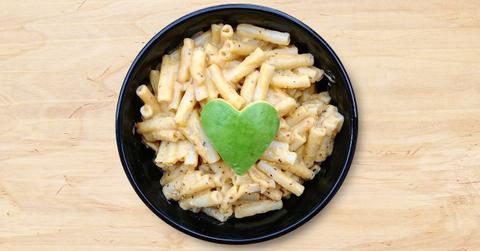Annie's New Mac & Cheese Helps Fight Climate Change
Annie's, Inc. is releasing a limited edition box of mac 'n' cheese produced with wheat grown with regenerative farming practices, which work to reverse climate change.
Updated May 22 2019, 12:50 p.m. ET
Like most people, you've likely never considered the potential for a box of macaroni and cheese to change the world. But organic food manufacturer Annie’s, Inc. is working to do just that. For the new, limited edition box of its famed mac 'n' cheese, the company is using wheat grown using regenerative farming practices—which goes above and beyond the qualifications for an organic label—and is highlighting the farmer that grew it, Nate Powell-Palm, in an effort to promote healthy farming practices.
“I think that’s a first in the industry: to offer a product on such wide distribution, available from a major manufacturer in the center of the store, where the family that’s about to enjoy the product can name the farmer, name the farm, and know the ingredients that are specific in that product that are using these very Earth-friendly practices,” Carla Vernon, president of Annie’s, told Fast Company.
Annie's has always used organic ingredients, but even organic farming on an industrial level can do harm to the environment. Mono-crops—or large swaths of farm land that are filled with a single crop over and over again—work to degrade soil health. This leads to the use of fertilizers, which further damages the soil, depletes water supplies, and releases carbon into the atmosphere.
Regenerative farming, on the other hand, works to reverse climate change by rebuilding topsoil and restoring degraded soil biodiversity. This leads to carbon drawdown—the soil actual pulls carbon out of the air—and improved water cycles. This is done by using old school farming methods no longer employed by the industrial agriculture industry, namely crop rotation.
On Powell-Palm's farm outside of Bozman, Montana, the farmer rotates his wheat crop with golden peas. This neutralizes the nitrogen in the soil—while wheat takes nitrogen out of the soil, the peas replenish it. Rotating livestock also graze the fields, which adds more nutrients to the soil via manure, and the farm also uses cover crops. This keeps the soil from sitting bare between harvest and planting, which can lead to carbon loss.
Annie's is using Powell-Palm's wheat for the pasta in its limited edition mac 'n' cheese (which will begin selling at Sprouts supermarkets this spring), but it's working with another farm to make a regenerative version of its “Organic Bunny Grahams" snack. To make the bunny-shaped cookies, Annie's is sourcing wheat and oats from Casey Bailey, a farmer who works near Fort Benton, Montana, and employs similar practices as Powell-Palm.
Annie's is considering these two products as the first of many in a plan to scale regeneratively farmed ingredients across its business, as well as the industry as a whole. The company has worked with General Mills to create a scorecard of best regenerative practices that it uses to identify top farmers in the field—which Powell-Palms and Bailey both are—as well as help other farmers identify how they can improve. And that's the second tier of this project: the company is working with farmers and organizations to get them into the effort. In South Dakota, General Mills is assisting farmers in converting thousands of acres from conventional farming to organic, and even some regenerative practices. The harvested crops will be used in Annie’s products.
“Farmers are anywhere on a spectrum of their interest and readiness,” Vernon told Fast Company. “But we’re trying to make sure that we also take time to understand what farmers need and where farmers are coming from, and what might be some of the barriers that make it difficult for farmers to move in this direction, and figure out if there is a way that with better understanding and better partnership, Annie’s can help to reduce those barriers, to remove those barriers entirely.”
To further showcase their commitment to environmentally beneficial farming practices, Annie's has also changed the design of its box. In addition to the farmers' names, the design is lead by dirt, with a little sign that reads, "soil matters!"
“We really believe that sometimes to do something big you have to start by doing something that might feel small,” Vernon told Fast Company. “But that if you do that small thing and it’s bold and exciting enough, the ripple effect is powerful.”
